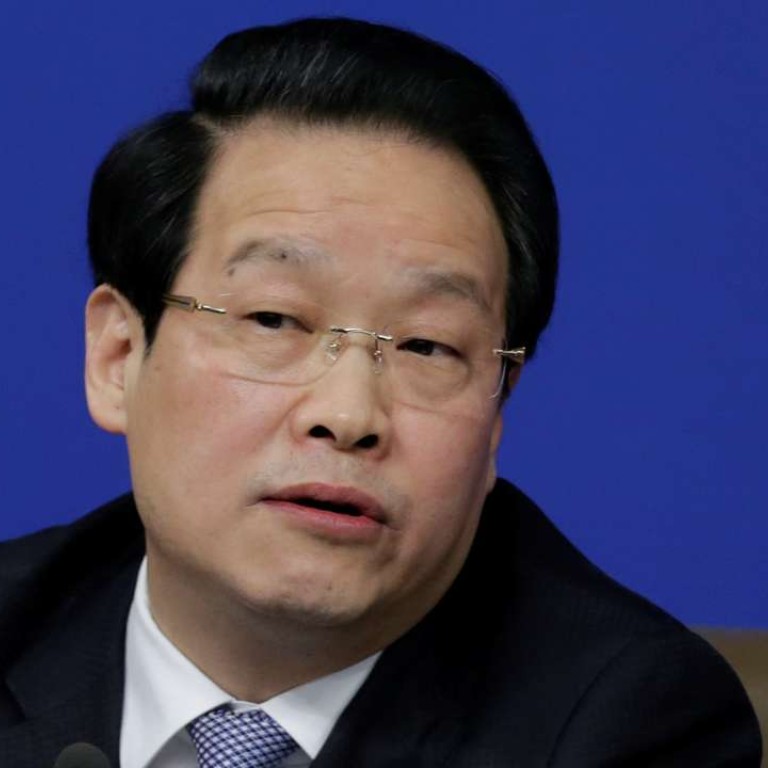
Successor of fallen top insurance regulator likely to be outsider, as top leaders continue to ‘clean up’ financial system
Li Keqiang’s speech on fighting against regulators colluding with powerful businessmen made public, shedding light on Xiang Junbo’s downfall
Beijing is likely to appoint someone outside the insurance regulatory body to replace Xiang Junbo, the country’s top insurance watchdog who is under investigation for what officials called “severe violations of discipline”, analysts say.
The fall of Xiang, 60, as chairman of the China Insurance Regulatory Commission (CIRC) is the latest in a mass anti-corruption clampdown within China’s financial sector, and could also herald accelerated mergers of some of the country’s main financial services regulatory bodies, they added.
A member of the Communist Party’s Central Committee, Xiang is the highest-ranking cadre in the financial industry to be caught up in the increasingly widespread crackdown on financial malfeasance.
“Given the central role of banking in China’s financial system, the chairman of the CIRC and CSRC (China Securities Regulatory Commission) usually comes from the banking industry, rather than internally or from any other regulatory body,” said Leon Qi, a senior analyst at Daiwa Capital Markets, referring to the country’s top securities watchdog.
Xiang began his career as an auditor, rising eventually to become a deputy governor at the central bank. He was president of Agricultural Bank of China, at one point operator of the country’s biggest banking network.
A year after being appointed chairman of the commission in 2011, Xiang introduced a set of new policies, dubbed the “13 new insurance rules” by industry insiders.
Mainland media portal Tencent on Monday quoted three unnamed sources suggesting Zhou Mubing, chairman of the Agriculture Bank of China, was highly likely to take over from Xiang.
“I would be very surprised if they choose someone from within the CIRC,” said Brock Silvers, managing director of Kaiyuan Capital, a Shanghai-based investment advisory firm.
He said two issues urgently need addressed by the watchdog: the huge volume of investment funds being held by insurance companies – raised through issuing structured products – and the potential risks of overseas investments made by companies in the sector.
“These two problems concern the top leadership most, and it would be difficult to get a clean break from the past by making Xiang’s assistant, for instance, the new boss,” he added.
China’s insurance industry has become a huge investment machine, undergoing rapid expansion and major changes in recent years.
Silvers added in particular the government will be keen to be seen as underlining its unhappiness with problematic or high-profile overseas investments by insurance companies, and other riskier practices, ahead of the upcoming crucial 19th Communist Party Congress in the autumn
Chinese insurance companies have been acquisition hungry, buying a number of flagship properties such as the Waldorf Astoria Hotel in New York, large stakes in international developments, and European financial institutions.

Xiang himself has seen been an active reformer since he took the reins, promoting more flexible use of insurance funds and insisting he was “giving innovation the biggest freedom”.
However, he U-turned on that call early this year, after several corporate raids backed by insurance companies shocked the nation.
In February, Xiang appeared at a press conference where he vowed the insurance regulator would take more punitive action to punish short-term speculators and reduce long-term risk.
Xiang said the CIRC would not allow the insurance industry to become a “rich men’s club” or hideout for “financial crocodiles”.
The “crocs” term has emerged, and been used regularly by China’s top officials, referring to powerful business people with strong political connections, while having a big say on financial markets.
Three hours after the official announcement of Xiang’s fall from grace on Sunday, an internal speech made last month by Premier Li Keqiang about combating corruption in the financial industry was published on the official website of the central government.
“Some individual regulators or senior managers have been colluding with financial ‘crocs’, taking advantage of their positions, and we have to impose severe punishments [on them],” Li was quoted as telling an anti-corruption meeting.
“The premier’s speech sheds light on why Xiang has fallen,” said Song Qinghui, an independent economist and author of Interpretation of the New Normal Economic Phase.
“Controversy and criticism has been triggered in recent years as the regulator first loosened its restrictions on short-term risky insurance products, and made room for aggressive investment by insurance companies,” he added.
“We have seen the fast emergence of smaller, privately owned insurance companies, such as Huaxia Insurance, Sino Life, Evergrande Life and Foresea, while some of the more aggressive players were using illicit money as sanctuaries or war chests to carry out corporate raids, huge cross-border buyout, to aid those ‘financial crocs’.”
“The CIRC, CSRC and CBRC (the country’s banking regulator) may be merged in certain areas, under this push,” he said.
The billionaire mainland businessman was believed to have been linked to market manipulation, related to 2015’s Chinese stock market rout. He has not been charged with any wrongdoing.
Huaxia Life, the life insurer he controls, earned 152 billion yuan (US$22 billion) in 2015, through issuing short-term wealth-management style products, the biggest earner among the insurance industry. It was founded only in 2006 with a registered capital of 400 million yuan.

